At the conclusion of the First General Session on Dec. 1, CSBA President Dr. Susan Heredia and President-elect Susan Markarian, surrounded by leaders of local educational agencies from across the state, led the Educate, Engage, Empower press conference highlighting boards’ successes and resourcefulness during a challenging period, previewing CSBA’s 2023 legislative priorities and making a case for ongoing investments to support student success. Their voices were heard around California as the pivotal moment was distributed by news organizations.

The former Harvard University debate coach and founder and CEO of the Veritas School of Social Sciences has earned accolades including being named one of the 100 most influential African Americans in the U.S. in 2020 by The Root magazine and landing on Forbes’ 30 under 30 list. But before that, he was an at-risk youth looking for acceptance and understanding.
“Stories change people more than data ever will and the reason why is because stories are the gateway to empathy,” Fleming said. “It’s what allows you to stand in someone else’s shoes … and it’s what allows you to feel what other people feel even if you don’t share the same experiences.”
Fleming asserted that education doesn’t have a content issue but a connection issue, as too many educators know their subject matter — but not their students. Educators must connect with the hearts of the young people they’re trying to reach and not just their minds, he said.
While equity has become a buzzword or divisive term, Fleming said that most people don’t know what it means. He uses his story to demonstrate what equity looks like. Fleming recalled spending his childhood hating educators as they didn’t want to deal with the self-described “menace of middle school.”
“Everybody had a label for me, everybody had a judgment for me, but nobody took the time to ask the right questions,” Fleming said. What school staff didn’t know was that when the academic day ended, Fleming went home to an abusive father. “I carried that weight, and I carried that pain with me to school at a time where I did not know how to ask for help … I didn’t have the words to be able to articulate my pain and so I acted out,” Fleming said. “I want you to imagine how many young people might be sitting in classrooms in your school district, and they too don’t know how to ask for help. They need somebody with just enough compassion to ask the right questions.”
“That is the definition of equity. It’s our willingness to see people for who they are and to meet them where they are.”
He eventually made it back to a college campus and his struggle with his lack of foundational academic skills led him to cheat. A relationship with a professor who flagged one of his essays for plagiarism changed things for him. Instead of being accusatory, the professor showed compassion and got to know Fleming, helping him to redo the essay and introducing him to Black scholars. “She put my humanity before my education,” Fleming said.
By connecting with his mind and heart, she broke down a barrier. “That is the definition of equity. It’s our willingness to see people for who they are and to meet them where they are,” Fleming said.
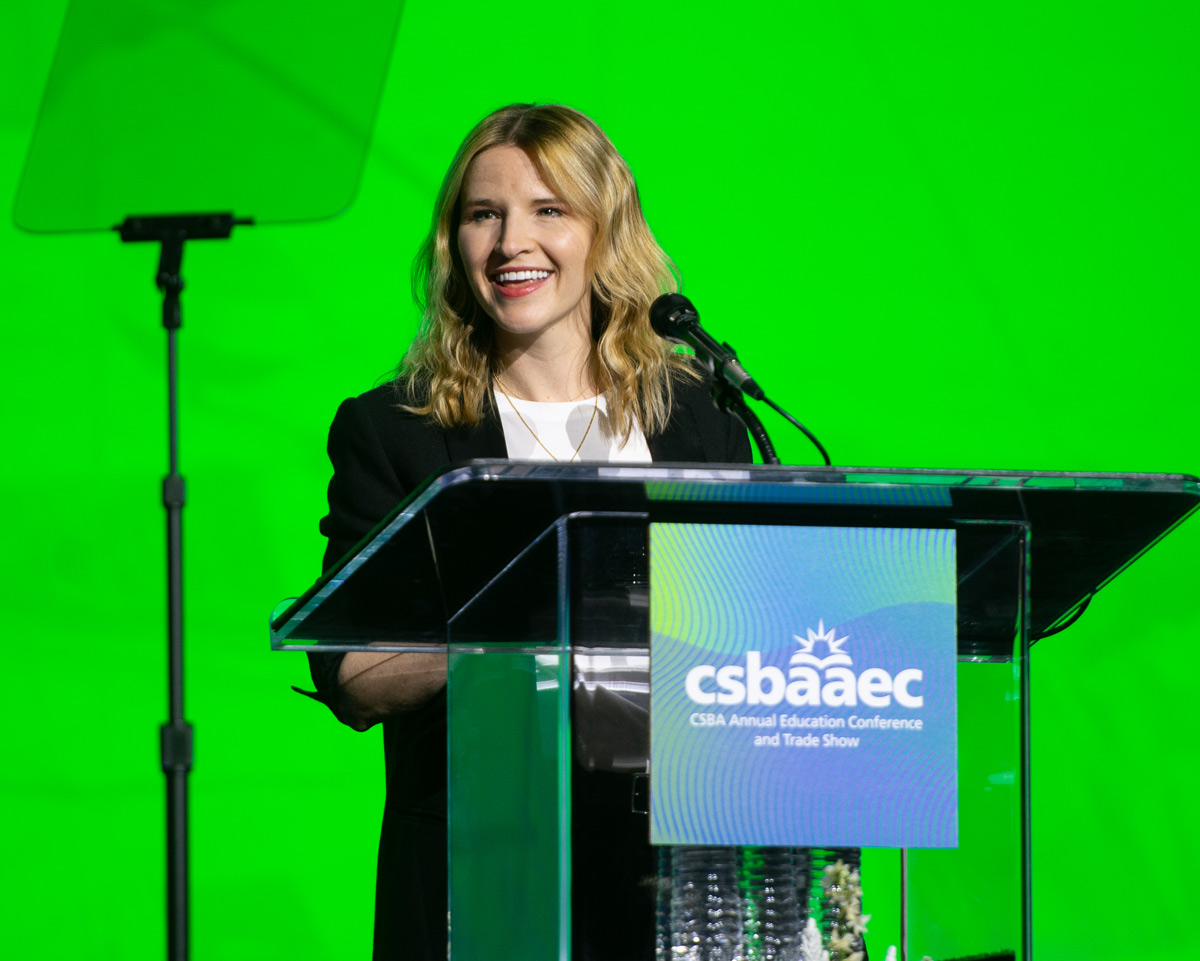
“Representation is the lens through which we dream. Representation is the lens through which we inspire. Why? Because young people cannot be what they cannot see,” Fleming said.
Why, after never having set foot in a public school, did Tara Westover leave the only life she’d ever known to work so hard to enroll at Brigham Young University (BYU)? Because she loved to sing.
That was made evident when Westover orchestrated a group sing along of “Row Row Row Your Boat” during AEC’s Third General Session to demonstrate how being in sync with the people around you and experiencing that community can release tension and make one feel safe and relaxed — something that children need now more than ever, she said.
“Children grow up in all kinds of households. The data has been clear on this — there are a lot of children who grow up in situations where they don’t feel safe. How can you learn when you’re frightened?” she asked. “You can go to school and it’s these kinds of group activities where we get these connections with other people, where our nervous system syncs with other people through music or dance or sports.”
Born in Idaho to a father opposed to public education, Westover never attended K-12 school. An older brother taught her to read, and the rest of her education was erratic and haphazard. She was 17 the first time she set foot in a classroom. After that first encounter with education, she pursued learning for a decade, graduating magna cum laude from BYU in 2008 and subsequently winning a Gates Cambridge Scholarship. She received an MPhil from Trinity College, Cambridge in 2009 and in 2014 was awarded a PhD in history.
In 2018, she published her memoir, Educated, which explores her struggle to reconcile her desire for education and autonomy with her desire to be loyal to her family. Debuting at No. 1 on the New York Times bestseller list and selling more than 8 million copies, Educated has been translated into 45 languages.
Her experience highlights what it means to obtain an education, which can sometimes have “less to do with curriculum than it is about education as a system of care for the mind, for the body — what makes people excited and … actually want to learn,” Westover said, noting that the extracurricular activities are key to addressing the whole child.
“I think education is not about just making a living; I think it’s about making a person. It’s about giving him or her the tools they need to live a richer, fuller life. And I worry that as economic and political pressures mount, that we might sand down our idea of what an education is. That we might end up preserving those things that make an individual of use to their employer, but we might lose those things that make that person of use to themselves,” she said. “Education gave me a way to understand others, and understand my own past, but more than that, it gave me an awareness of my own self and my own life. And the knowledge that the life I was living at that moment was just one of many possible lives — that there could be others.”
Second General Session
The Second General Session featured education and finance experts in panels moderated by CSBA CEO & Executive Director Vernon M. Billy.
The economic forecast
“Beyond the Numbers: An Inside Look at Education Funding” featured California Association of School Business Officials (CASBO) CEO Tatia Davenport and School Services of California President and CEO John Gray. The panelists shared an overview of the economic forecast and priority advocacy areas for 2023, as well as a discussion on the key role of chief business officers in local educational agencies.
Gray said that the run of economic prosperity the state has experienced since the Great Recession is “softening.” California is reliant on a very small population of earners — the top 1 percent — that contribute about half of the state’s revenue.
“We know, how goes the economy, so goes public school funding in this state,” he said. “The big thing out there impacting funding is inflation … One of the side effects of inflation is increasing interest rates.” This, in turn, affects the stock market and the spending behavior of those top earners. “Revenues have slowed, and they are coming in under projection,” said Gray. “The state is going to have a $25 billion deficit after having a large surplus.”
While declining enrollment amid this economic downturn is a concern, “this is not the time to panic,” Gray said, explaining that LEAs are on much better footing since the Great Recession with not only their own healthy reserves, but with a general state reserve and a Proposition 98 reserve.
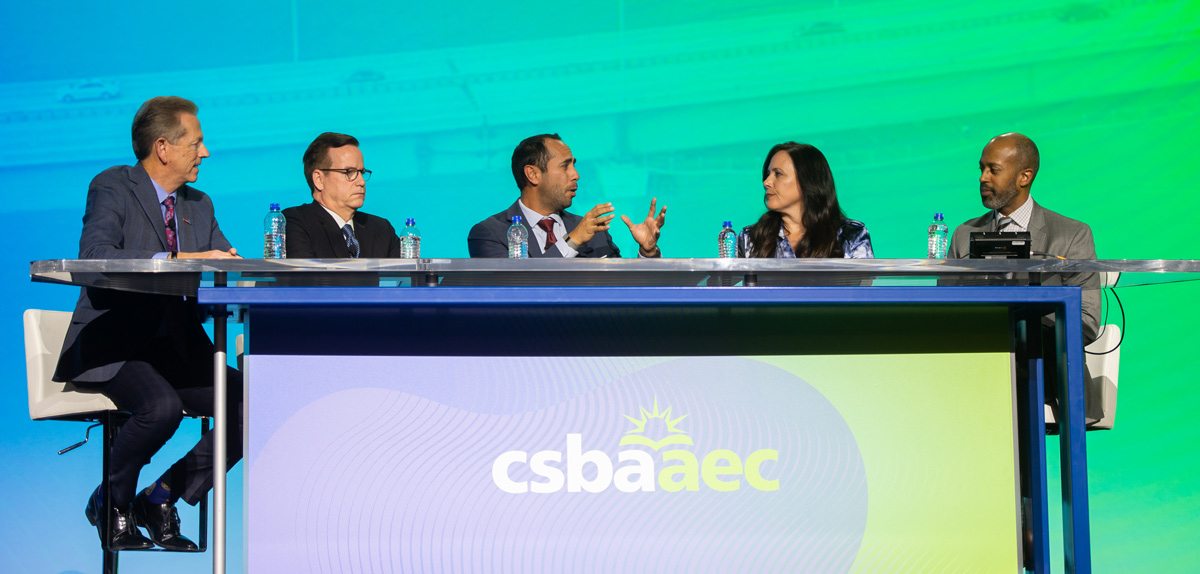
The Legislative Analyst’s Office (LAO) is projecting a statutory cost-of-living adjustment (COLA) for Prop 98 of nearly 9 percent. Both panelists expressed concerns that the state might not be able to meet this crucial obligation. CASBO’s Davenport talked about the importance of not only advocating, but educating the Legislature on the importance of base funding. “By 2024, there will only be three legislators left who were around during the formation of LCFF and the LCAP,” she said. “We have a role to collectively advocate for all dollars to go to the base.”
The role of managing those different funding streams is reliant on an LEA’s chief business official (CBO). According to Davenport, about 200 of the state’s 1,000 CBOs are in their first two years of service and about 250 are in their last two years of service.
“The call to action is this: If you have a CBO that is new to your environment, it is imperative that you invest in their professional development — education finance is incredibly complicated,” Davenport said. “On the other side, if you have a CBO who is retiring, make sure you put in a succession plan about a year ahead.”
The state of public schools
Continuing a theme from the previous panel, Gordon highlighted underperforming state revenues, but found a silver lining — for the first time, the LAO report did not refer to Prop 98 as a ceiling. “We have to be vigilant and prepared to fight the good fight to whatever that COLA is that we are entitled to. When they only fund COLA, especially when it’s funded below inflation, it’s like standing still.”
COLA is not the only battle board members should prepare for though, according to Meyers. “Our real battle is outside of Prop 98 because there are things we did not get in the current budget year. We still have to fight for TK facilities, CalPERS and STRS and continuing to adjust Proposition 98 upward,” he said.
Zazueta reflected on the plethora of new initiatives that LEAs have implemented this year, and the challenges that come along with them. “It’s transitional kindergarten, universal meals, expanded learning — it’s all of these initiatives we all agree are good for kids. Now it’s about getting the implementation right at a time when we are now facing uncertainty in the budget.”
On top of that, “we have some real human capital challenges,” continued Zazueta. “If you don’t have the people to serve the students — that’s the biggest issue.”
Switching gears, Billy asked EdSource’s Vasquez what the top education issues are from a journalism perspective. Vasquez named community schools, tutoring and reading instruction as the three top areas. “The pandemic really brought home the need for community schools, particularly in low-income communities and minority communities,” she said.
The panel also discussed this year’s dismal, if not unexpected, assessment scores. “We learned what we already knew — that the pandemic affected kids,” said Zazueta. “We were assessing at the height of the omicron wave with significant teacher shortages. I think it’s important to take that data in its proper context. We need to think of this as the new baseline.”
“Information is power, and it is really important to know where we stand,” added Vasquez.
Advocating in the new year
The panel recognized that a slew of new members are joining the Legislature. “Of the 120 legislators, there are not more than 15 or 20 who serve on any committee that deals with education,” Gordon said. “All the rest of them rely on you.”
“Here’s an opportunity to educate the new folks,” agreed Zazueta. “Elected officials will go to their school board to be their eyes and ears. We have this new responsibility and yes, advocate, but first by really setting that base line — educating them on what the state of schools is.”
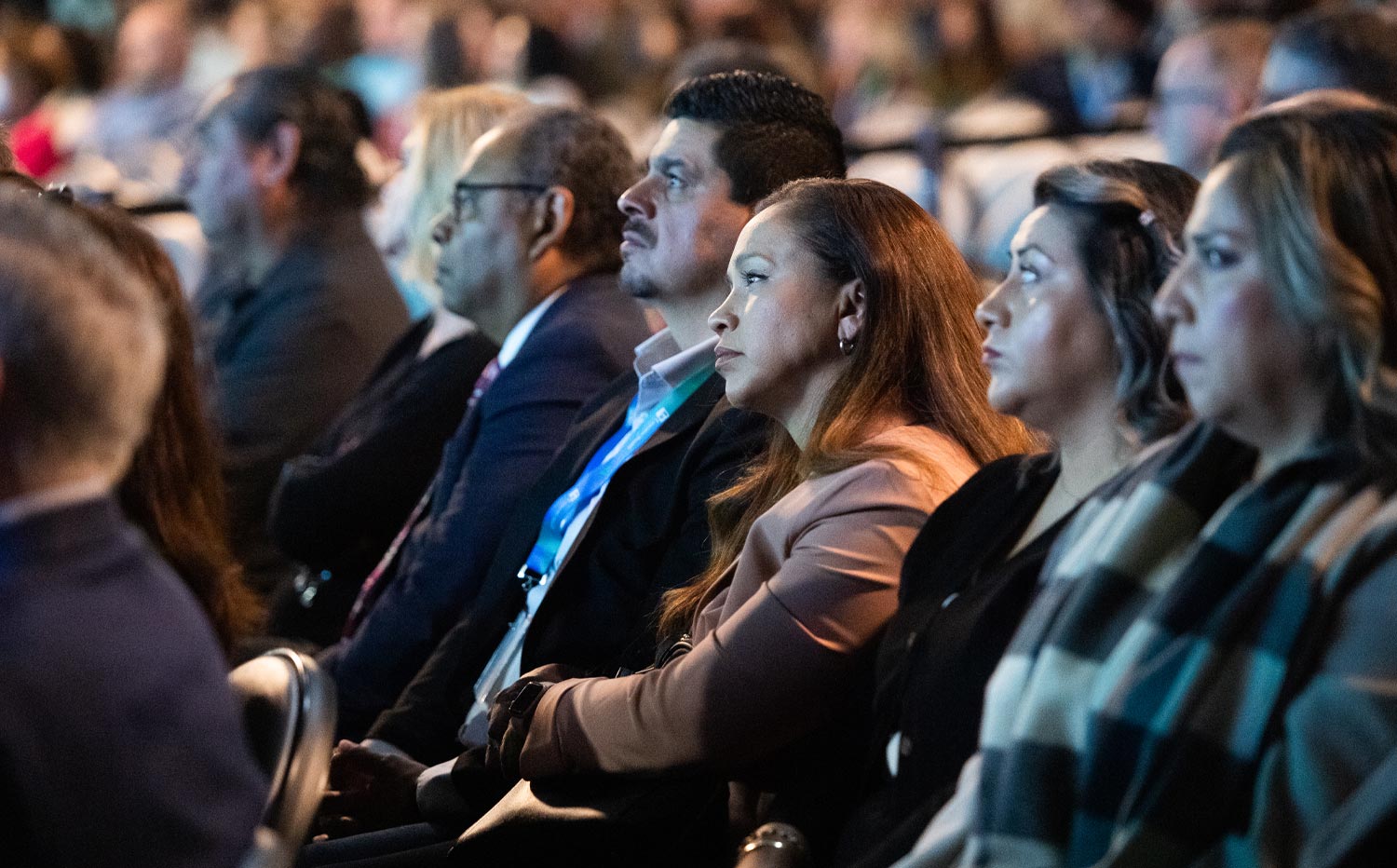

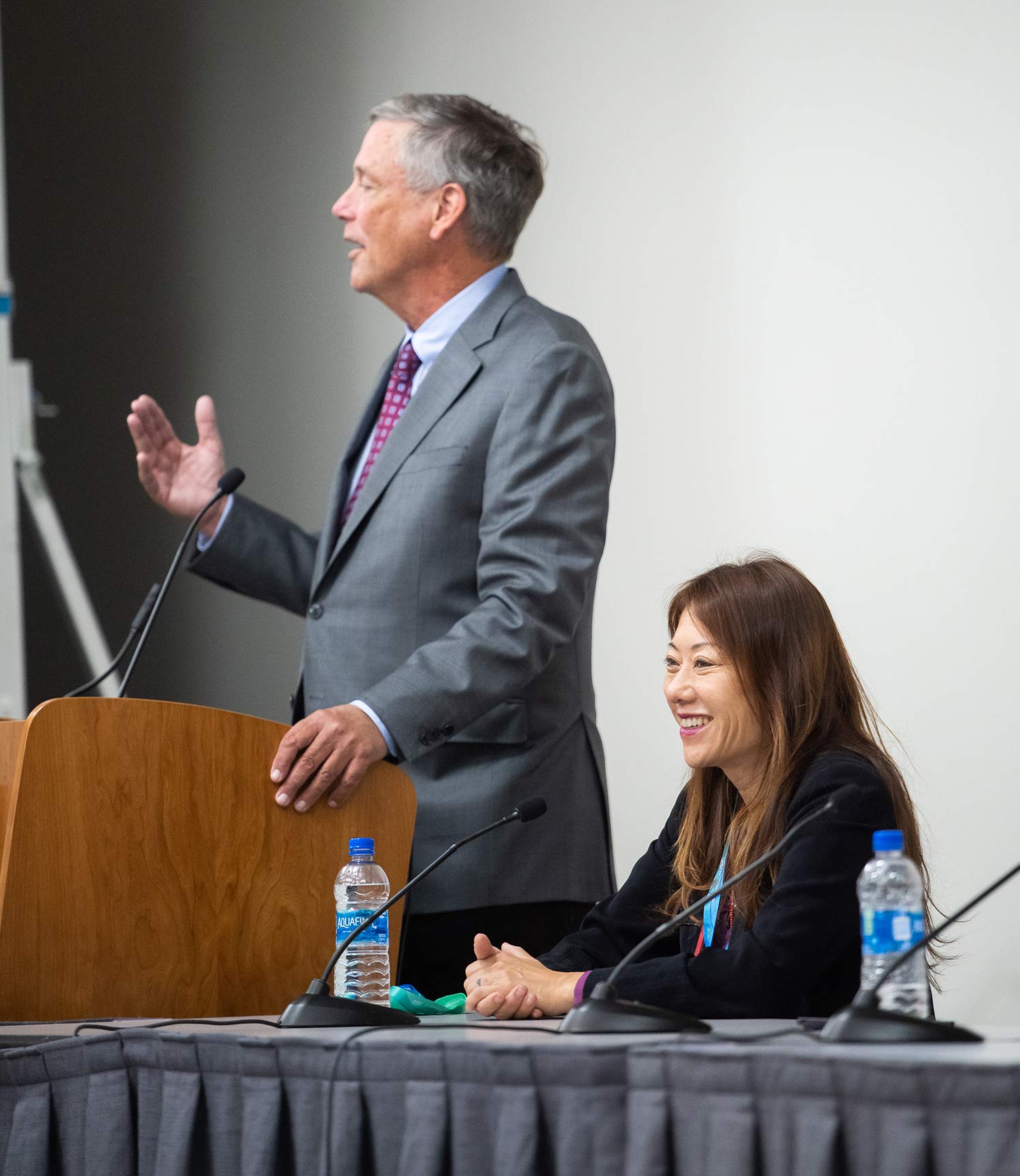
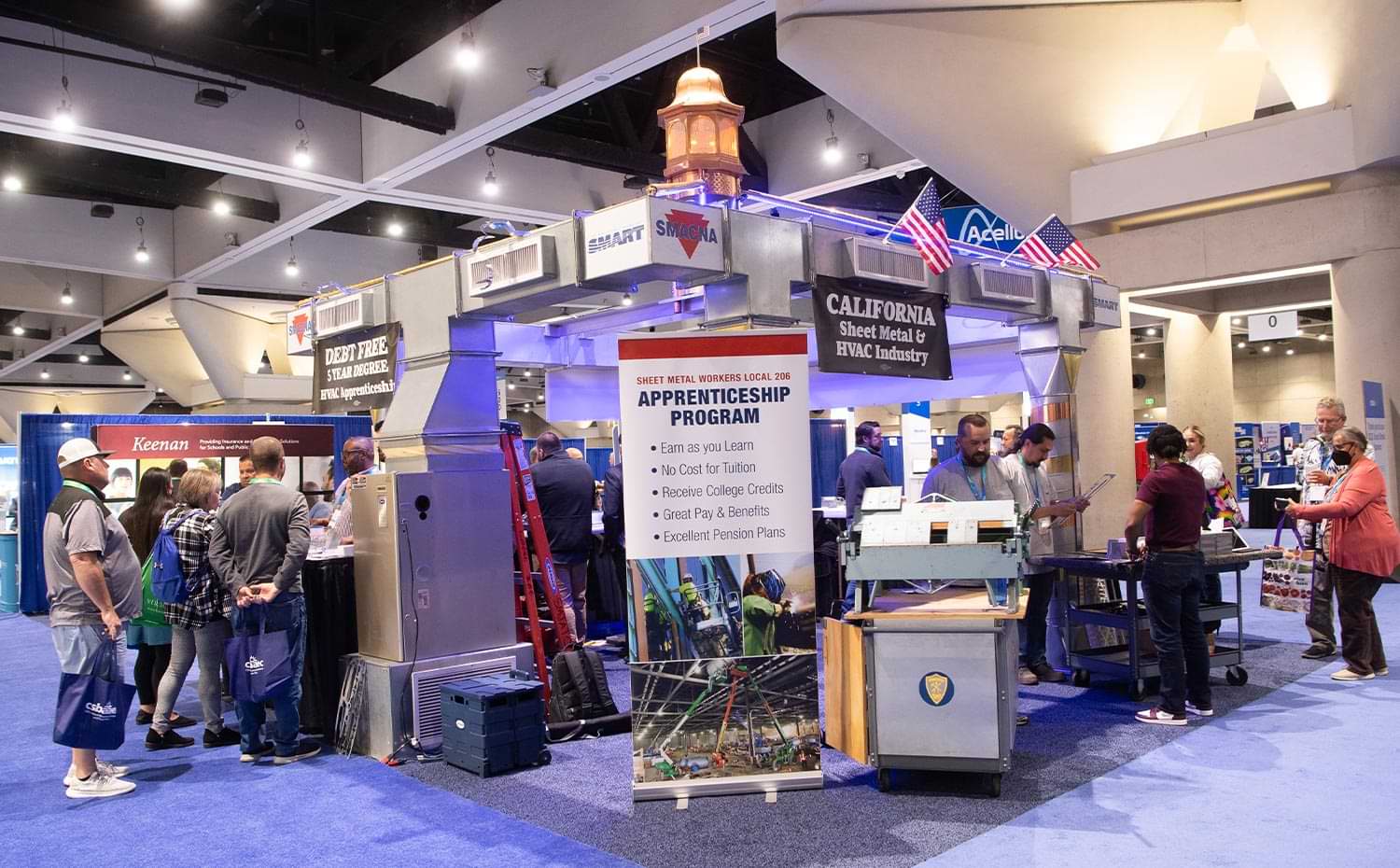
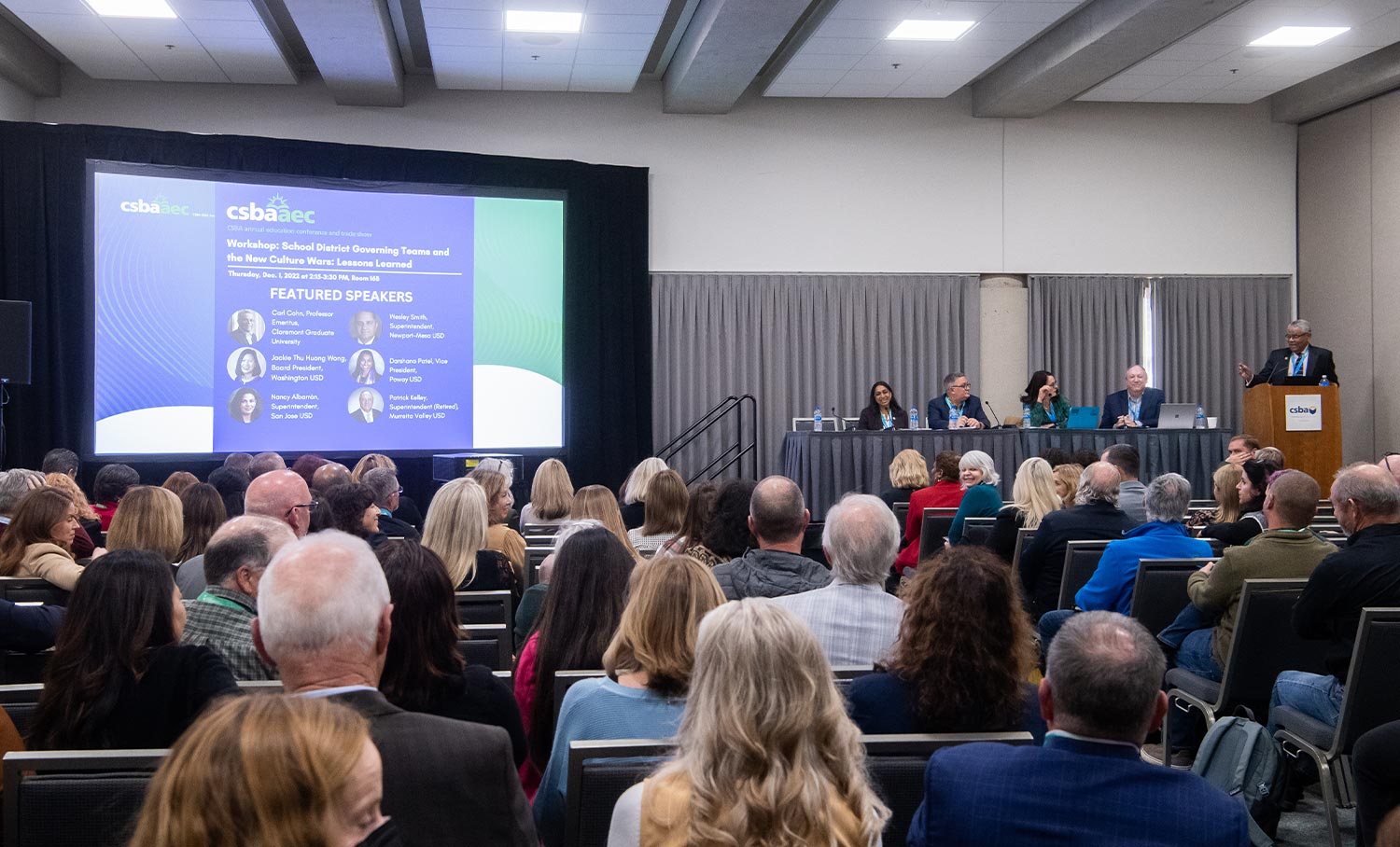

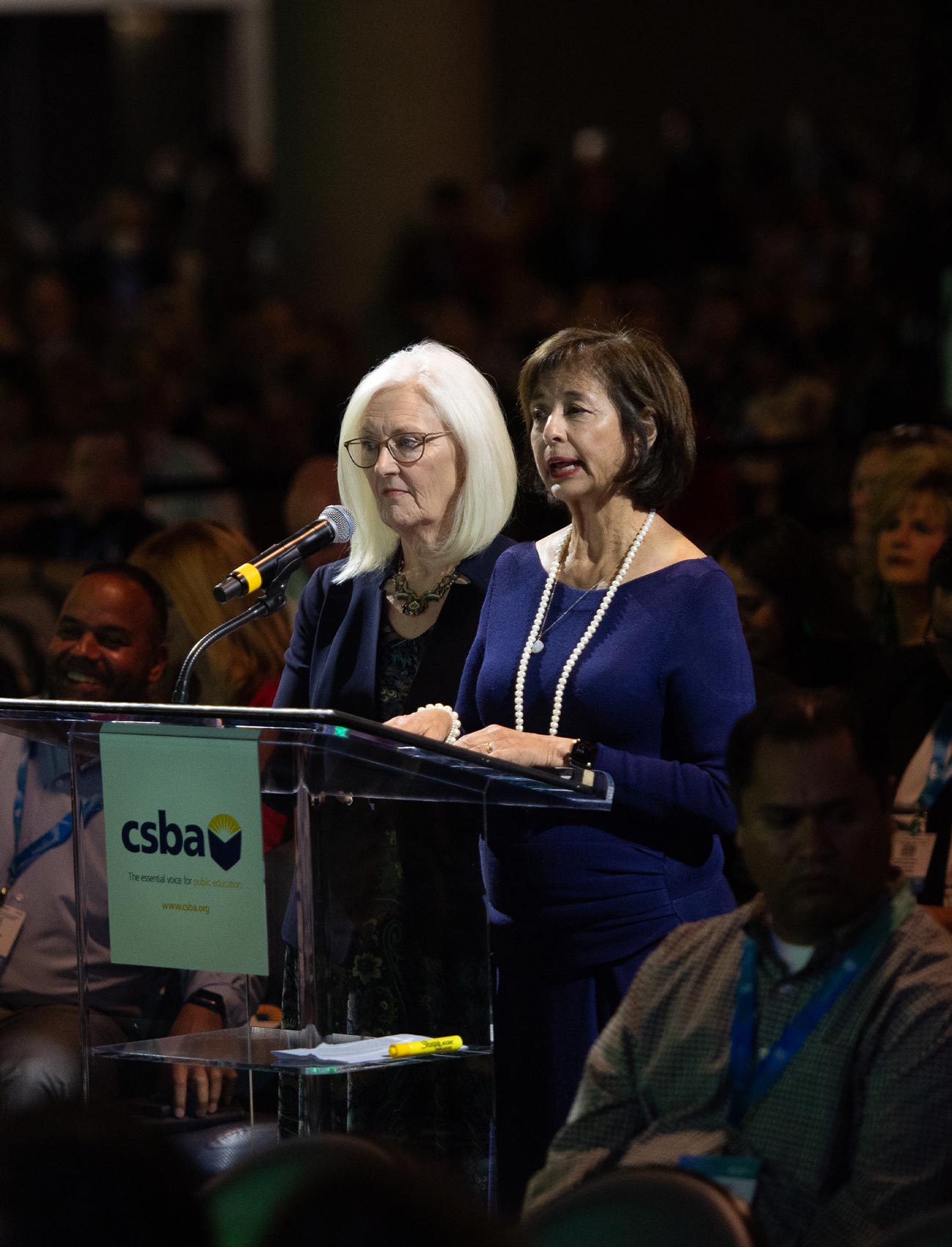

1) An engaged crowd listens to Brandon P. Fleming. 2) The Coachella Valley High School SLP Dance Team performs at the First General Session. 3) Capitol Advisors Group Partner Jack O’Connell and California State Treasurer Fiona Ma present in a fiscal forecast session. 4) The Trade Show Floor. 5) Claremont Graduate University emeritus professor Carl Cohn speaks at a session about governing in contentious times. 6) La Quinta High School’s Vietnamese Student Association performs at the Second General Session. 7) CSBA President-elect Susan Markarian and CSBA President Dr. Susan Heredia address the crowd and media outlets during the media event. 8) Student board members interact during their tailored CSBA daylong training.